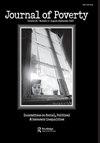首先是儿童,然后是就业:欧洲的贫困和家庭内部不平等
IF 0.9
Q3 SOCIAL WORK
引用次数: 0
摘要
摘要本文利用来自22个欧洲国家的数据,研究了儿童和成年人之间的家庭内部不平等。家庭根据考虑年龄、性别、亲属关系和劳动力市场参与度的动态规则分配资源。父母和失业者最容易遭受剥夺。延长共同居住权是减少儿童贫困的一种有用但有限的策略:扩大家庭更有可能保护儿童,但也会更穷。儿童优先次序几乎是普遍的,没有证据表明收入或教育与儿童优先次序之间存在联系。个人贫困数据提供了关于家庭内部不平等的宝贵信息。本文章由计算机程序翻译,如有差异,请以英文原文为准。
First the Children, then the Employed: Deprivation and Intra-household Inequality in Europe
ABSTRACT Using data from 22 European countries this paper examines intra-household inequality between children and adults. Households allocate resources according to dynamic rules that consider age, gender, kinship and labor market participation. Parents and the unemployed are the most likely to experience deprivation. Extended co-residency is a helpful but limited strategy to reduce child poverty: extended households are more likely to protect children, but also to be poorer. The prioritization of children is nearly universal, with no evidence of an association between income or education and the prioritization of children. Individual deprivation data provide valuable information on intra-household inequality.
求助全文
通过发布文献求助,成功后即可免费获取论文全文。
去求助
来源期刊

Journal of Poverty
SOCIAL WORK-
CiteScore
2.60
自引率
10.00%
发文量
26
期刊介绍:
The Journal of Poverty is the first refereed journal to recognize the inequalities in our social, political, and economic structures, presenting progressing strategies that expand society"s increasingly narrow notions of poverty and inequality. The journal"s broad understanding of poverty—more inclusive than the traditional view—keeps the focus on people"s need for education, employment, safe and affordable housing, nutrition, and adequate medical care, and on interventions that range from direct practice to community organization to social policy analysis. The journal"s articles will increase your knowledge and awareness of oppressive forces such as racism, sexism, classism, and homophobia that contribute to the maintenance of poverty and inequality.
 求助内容:
求助内容: 应助结果提醒方式:
应助结果提醒方式:


